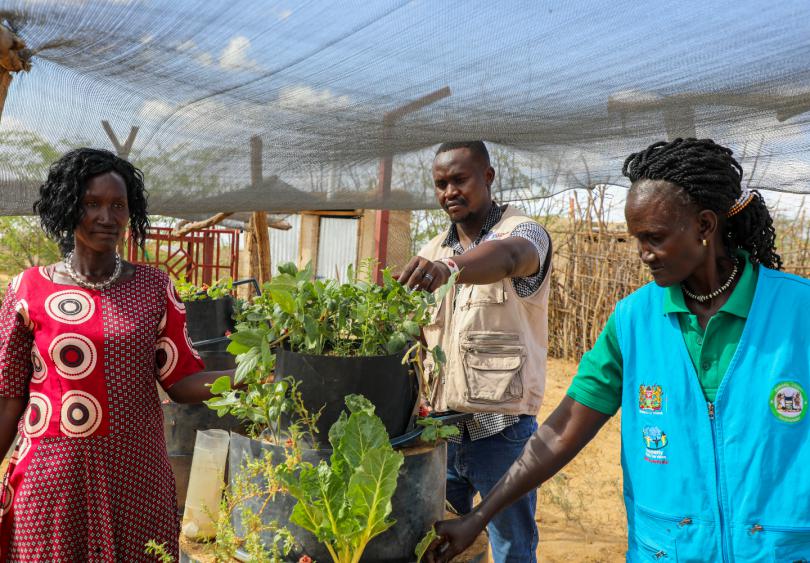EMPOWERING COMMUNITIES: THE IMPACT OF USAID NAWIRI RESILIENCE PROGRAMME IN TURKANA NORTH

John Abong, attending a meeting held by Soweto AM2MSG. Photo Courtesy|Dorothy Waweru, Save the Children
By Dorothy Waweru & Ekiru Kamare
21 kilometers deep into Turkana North, a group of about twenty women have gathered for their weekly meeting. This group is known as Soweto Adapted Mother-to-Mother Support Group (AM2MSG) and was formed in 2022. Some of the women have their children with them and after a short prayer by one of the members they all sit on a nicely woven mat stationed under a tree perhaps to hide from the already scorching sun. The presence of one gentleman, John Abong cannot go unnoticed. He is the only man in this female-dominated group.
A quick chat with Abong reveals that he was drawn by the sheer determination of saving money by the women in this group. He tells us that in 2022, while going about his activities, he bumped into this group during one of their meetings and he requested to join them to learn what they were also learning. This he says was the best decision he made. As a father of five children, he says his motorbike business does not give him enough resources to care for his wife and children’s needs.
Therefore when he learnt that the Soweto AM2MSG was involved in savings and loaning he was elated. Further, Abong says that he came to learn about the USAID Nawiri programme weeks into joining the group.
“Officers from Nawiri used to visit the group and they taught us to farm green leafy vegetables and poultry keeping. Through Nawiri, I learnt the importance of proper nutrition, including farming and cooking vegetables, to improve our children's nutrition. In my small farm, I have kales, spinach, and other vegetables which I ensure my family consumes. In addition, we were taught on the importance of saving and how we can use the saved money to start profit-making businesses. From these lessons, I was able to start chicken rearing but a sudden illness claimed all of them, about 50,” says Abong.
Previously, Abong says that he would get vegetables from Kitale almost 500 kilometers away from where he lives. Those vegetables had been highly sprayed with preservatives therefore they were not fit for consumption. Nowadays as he rightly put it, he fetches the vegetables from his farm which his children eat and notably, their health has improved greatly.
As we continue to talk with Abong he shares that one day his second-born child was bitten by a poisonous snake while going to school. He had to quickly rush her to the hospital on his motorbike as he prayed for her survival silently in his heart. Luckily, at the hospital, his daughter was attended to and a few drugs were prescribed. Abong says he did not have enough money at the time and that were it not for the Soweto AM2MSG group loaning him with some money he fears the worst would have happened to her daughter.
Ekiru Kamare, Household Economic Strengthening Coordinator in the USAID Nawiri programme says that the USAID Nawiri programme aims to sustainably reduce persistent acute malnutrition in Turkana and Samburu counties.

Members of the Soweto AM2MSGs in their kitchen garden. Photo Courtesy| Save the Children
“Through the AM2MSGs, Nawiri is looking at addressing some of the issues causing malnutrition more holistically. One of the successes of the AM2MSGs has been closure of the knowledge gap in terms of economic empowerment. Through Nawiri, mothers who never thought they could own businesses are now business owners. In addition, mothers have also learnt about proper nutrition including which foods to give their children in order to do away with malnutrition. Finally, social cohesion has been improved and mothers are now united under one goal which is to reduce malnutrition,” Ekiru, Household Economic Strengthening Coordinator.
A few kilometres from where the women in Soweto AM2MSGs converge is a dispensary. Peter Lokudi who is a nutritionist in this facility says that some of the common childhood illnesses he sees in the children who visit the facility are diarrhoea cases, malaria and flu. He says that previously, pregnant mothers would also visit the facility with malnutrition but since Nawiri started conducting integrated health outreaches at the community level, the number of pregnant and lactating mothers with malnutrition has gone down significantly.
“In 2021, we collaborated with Nawiri to do a massive mass screening of children and community members to check the malnutrition status and the results revealed that there was a huge malnutrition burden in this area. By then we used to admit over 20 children with severe acute malnutrition (emergency phase) and over 30 children with moderate acute malnutrition. For now, we do not have any children in the emergency phase and less than 5 cases of moderate acute malnutrition,” says Peter.
USAID Nawiri programme has changed the lives of community members in Turkana North. Through the anchor group model which entails the AM2MSGs, Girl and Boy groups, and Rural Entrepreneurial Access Project (REAP) for Nutrition (R4N) groups every community member has been targeted with interventions aimed at improving health and nutrition services uptake further leading to the sustainable reduction of acute malnutrition.




